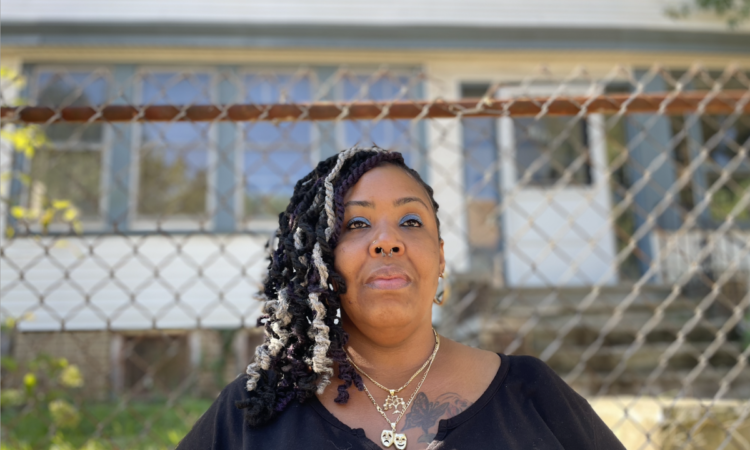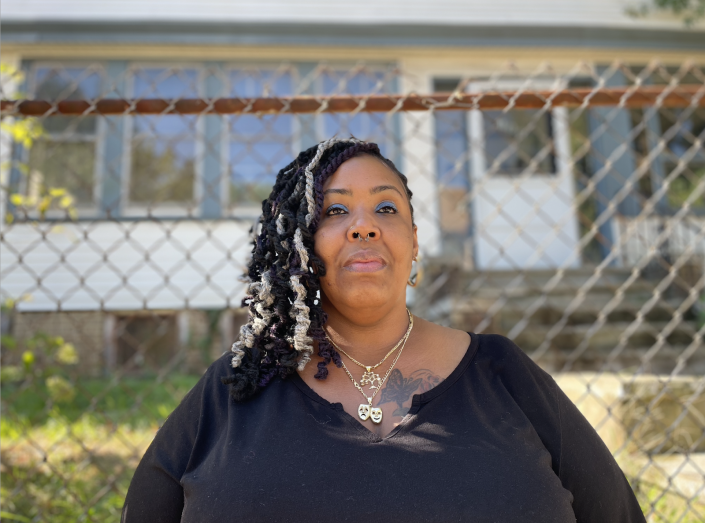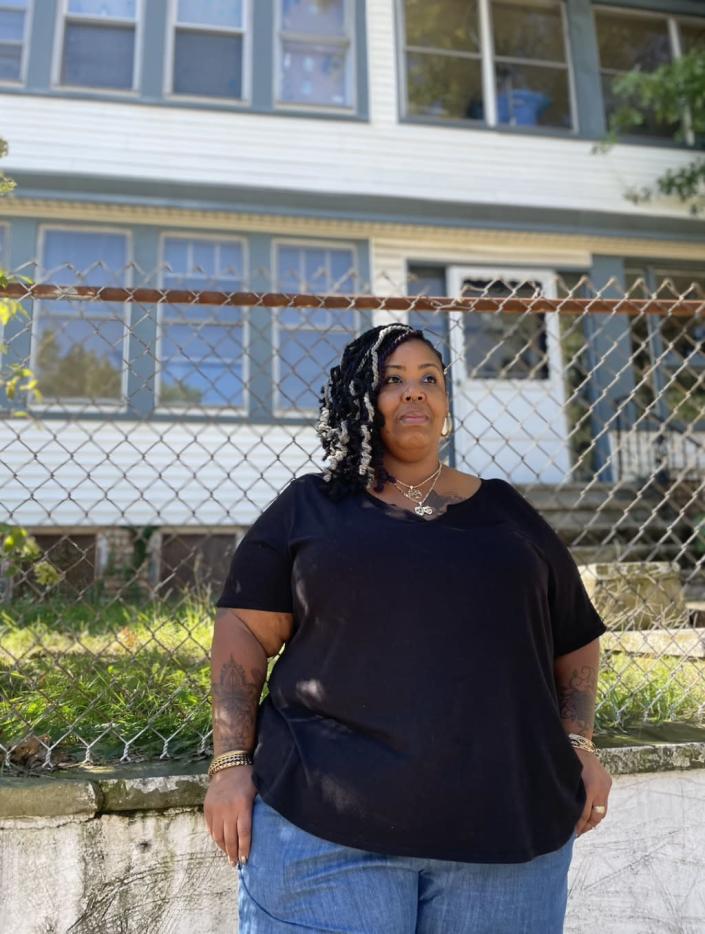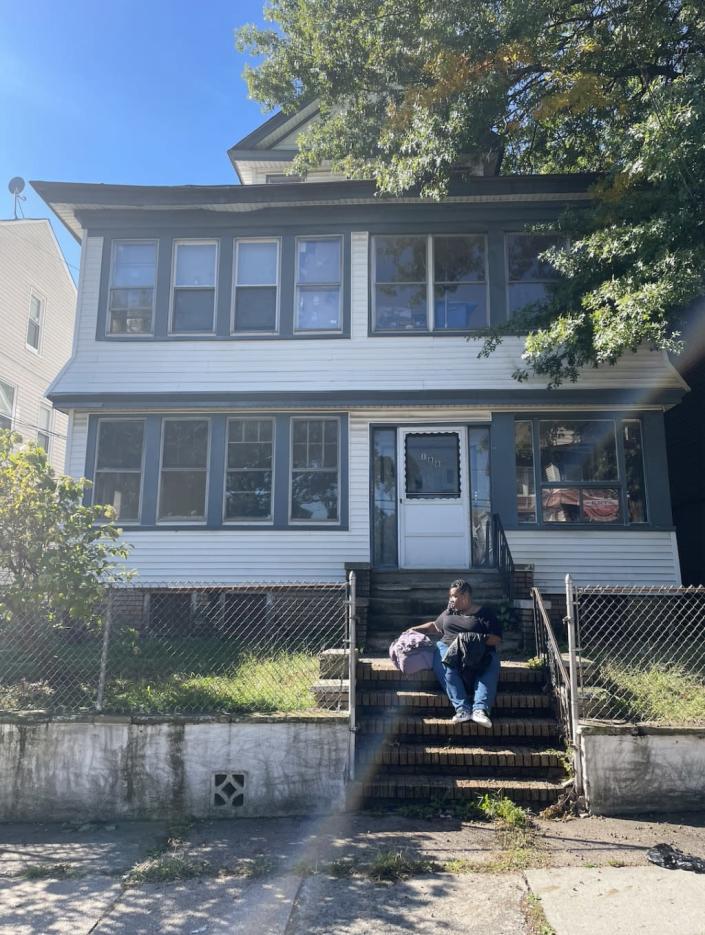Forced to move out of her home, a mother and her special-needs son struggle to find options

“It is devastating,” said Latasha Tatum, whose family home in Newark, N.J., went into foreclosure, kicking off a chain of events that may leave her homeless.
NEWARK, N.J.– Latasha Tatum has to leave the only home she’s ever known in less than three days.
“To say that it is devastating is a complete understatement,” Tatum told theGrio in an interview from her home in Newark, N.J.

For nearly her entire life, Tatum, 40, lived on 188 Renner Ave., one of the many spacious homes in the predominantly African-American neighborhood of the Weequahic section of Newark. It’s a quiet block with green trees towering over front lawns, perfect for family gatherings Tatum once enjoyed before her grandmother got dementia.
“She went from being this independent, sophisticated woman, doing everything for herself, to only being fed mashed potatoes and can’t walk 10 feet by herself,” Tatum said.
Her grandmother’s health struggles morphed into financial struggles. Tatum says that after years of believing the home was paid off, she learned in 2017 that her grandmother had a reverse mortgage, but even she didn’t understand the financial implications.
A reverse mortgage works differently than a traditional mortgage and is often marketed to elderly homeowners. Rather than pay mortgage payments each month to a lender, homeowners can use the equity on their home as a line of credit. With enough equity, money can be pulled out, helping seniors who may have reduced income not have to come out of pocket.

But homeowners must keep up with insurance and taxes, and if a single deadline or requirement isn’t met, the home can be foreclosed on and taken away. Reverse mortgages leave heirs to the home responsible for payment after the owner dies. A 2019 investigation by USA Today found that reverse mortgages in majority Black neighborhoods were six times more likely to result in foreclosure than in neighborhoods that were 80 percent white.
As Tatum’s grandmother’s health deteriorated, her home went into foreclosure. Then when her grandmother died in August 2020, the situation worsened.
After her grandmother’s death, Tatum learned there was more than $300,000 worth of debt accumulated through the reverse mortgage. Tatum says her attempts to negotiate a payment arrangement with the bank that owned the mortgage fell on deaf ears, and in April of this year, the home went up for sale at a sheriff’s auction.
“I was very broken. I was hurt. This is the home that my grandfather passed away in, my grandmother passed away in, the home I was brought home from the hospital in as well as my son,” Tatum recalls, holding back tears. “And to find out that it’s gone and there isn’t anything I can do to keep it.”
The business of buying Black-owned homes
Tatum’s family home was purchased by owners who operate under an LLC based out of Brooklyn. The phenomenon of LLCs purchasing homes is happening across New Jersey and nationally.
“In the current housing crisis and the pandemic, private investors know from [the 2008 recession] how lucrative these foreclosed homes are as assets and have been setting aside huge amounts of liquidity to capture all of this real estate,” said Nick Graetz, a research associate at The Eviction Lab at Princeton University.
Graetz says analysis of 40 of the biggest cities in the U.S. showed that 30 percent of sales in majority Black neighborhoods were real estate investors compared to 12 percent of real estate investors in other zip codes.
“Those investors represent a powerful political coalition to lobby local policymakers on housing,” Graetz told theGrio. “That obviously has tons of ramifications for how hard it will be then for that family to find a new place to rent or live in that neighborhood where they’ve always lived because now you have an increasing housing stock that’s owned by absentee investors and landlords, which makes it more difficult to purchase a home as home prices skyrocket.”
While conducting this interview, a car drove up with a man Tatum identified as being part of a regular group of men who ride through the neighborhood, asking if people would like to sell their homes.

Tatum shares the home with her 18-year-old autistic son, who also struggles with speech delay and mental health disorders. She fears being ejected from the home will disrupt her son’s sense of stability and that moving away from the Newark area means losing the educational programs he participates in.
Tatum says although she initially got a verbal promise from one of the LLC owners that he would provide time to find a new place, she was served papers to vacate the home anyways.
“I told [the owner], I have a special-needs son who’s just getting back on track with things. Is it possible that we can work out a payment arrangement? I’m more than willing to pay rent,” Tatum says. “He told me, and his exact words were, he is not a landlord. He’s a businessman.”
The owner of the property declined to comment on this story.
Where to go next?
Tatum’s attorney, who provided legal representation for her through the Community Health Law Project, confirmed that after negotiating in September, the home’s new owners offered Tatum a $1,000 settlement and gave her a date of Oct. 15 to leave the premises.
Tatum says she took the settlement and firm moveout date rather than leave the decision to a judge, who could have given her as little as 10 days to vacate. Because Tatum did not have a lease on her grandmother’s home, although she could’ve been an heir to the home, she is not considered a tenant. The situation is known as informal eviction.
“We’ve created this situation where a lot of the American safety net relies on individual wealth, family wealth, to sort of bolster people, and they run into these acute emergencies,” says Graetz.
“We’ve seen that the households being evicted during the pandemic tend to be Black renters,” Graetz said. “These are often households with too little savings to bolster against those kinds of risks.”
According to Graetz, while Black Americans make up about 20 percent of all adult renters, they represent over 33 percent of eviction filings.
“There really isn’t anything you can do about it,” Tatum said. “There are so many programs for other people to come into these urban communities to get advancement in help. But the people that have established relationships in life here, there’s no help for us.”
Because of health issues, Tatum receives Supplemental Security Income (SSI), and she says she isn’t eligible for temporary rental assistance. Many housing programs she called haven’t called her back or told her they can’t help until she is actually homeless. Others have advised her to go to a homeless shelter and then apply for Section 8, which may take months. Tatum fears being separated from her son at the shelter because he is 18 and legally an adult.

As Tatum combs through apartment listings and calls programs and advocates seeking any form of help, the unemployed mother of one says the stress of her housing situation has taken a physical toll. She suffered a heart attack earlier this year and says she can’t sleep at night.
“Whenever I inquire about apartments, you have to have a credit score of over 620,” Tatum said. “You have to have paystubs. You have to make double, if not triple what your rent is. Let’s be realistic. Who has that?”
A recent report lists New Jersey as the seventh most expensive state in the United States for rent.
Tatum’s story is one that is relatable to many Black Americans who have found out the importance of estate planning, credit ratings, and homeownership when being blindsided by roadblocks in each system. Tatus hopes her trial with housing will inspire others to triple-check their family’s affairs by asking for paperwork.
“We tend to look at our elders as the way they used to be and not who they are now,” Tatum said. “I still wanted to give my grandmother her independence, if I was a little more nosey, maybe I could have did something at that time, and I wouldn’t be in the predicament I’m in now.”
Now with the clock ticking, Tatum admits she is struggling to pack her family’s belongings. She still has not found housing or a storage facility to put all of her items and is praying for a miracle to come to the door of Renner Avenue before she has to say goodbye permanently.
“Reverse mortgages and these big corporations, LLCs, come in like a thief in the night. And then where does that leave you? There’s no more legacies,” Tatum said pointing down the street where she once could identify all her neighbors by name.
“I just need assistance, that foot in the door, and I can handle the rest. I’m not asking for a handout, but, you know, everybody needs somebody.”

Natasha S. Alford is VP of Digital Content and a Senior Correspondent at theGrio. An award-winning journalist, filmmaker, and TV personality, Alford is writing her forthcoming book “American Negra.” Follow her on Twitter and Instagram at @natashasalford.
TheGrio is FREE on your TV via Apple TV, Amazon Fire, Roku, and Android TV. Please download theGrio mobile apps today!
The post Forced to move out of her home, a mother and her special-needs son struggle to find options appeared first on TheGrio.






